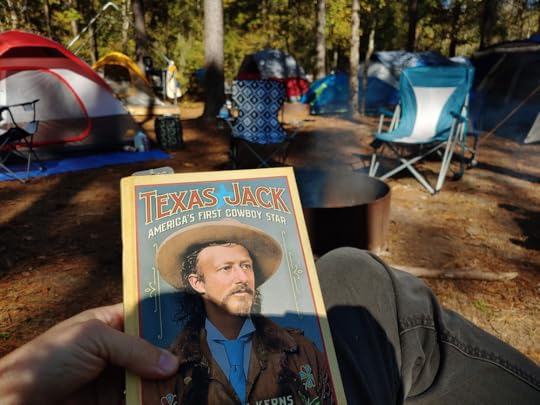Matthew Kerns's Blog: The Dime Library, page 24
January 5, 2022
January 4 1872
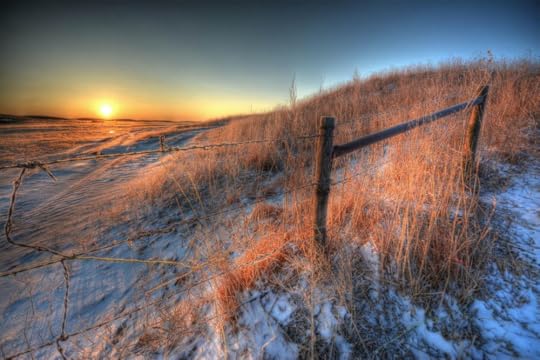
December had been quiet on the Nebraska prairie, but winter had come and the new year would bring nothing but excitement for Texas Jack and Buffalo Bill. Russian Grand Duke Alexis was in America, and was making for Fort McPherson. Cody and Omohundro had led hunts for notables, dignitaries, and aristocracy before, but this buffalo hunt would thrust them into the national spotlight and change their lives forever.
From the Chicago Tribune, January 4, 1872.
Alexis' Buffalo Hunt
General Sheridan's arrangements for Alexis' grand buffalo hunt are now fully perfected. The ducal party, accompanied by General Sheridan and three of his aides—General Forsyth, Colonel Forsyth, and Colonel M.V. Sheridan—expect to arrive at Fort McPherson on the 13th inst.
The party will proceed to North Platte Station on the ducal train, where all the servants will be left during the absence of the part on the hunt, which will taken them from the railway some six or eight days. It is the intention of all those who go to the hunting ground to take up the military mode of life and dispense with the luxuries of servants, carriages, etc.
The journey between North Platte Station and the buffalo region will be made by horseback and ambulance, and the Russians will be treated to a good specimen of "roughing it" in winter on the plains. The reports from that region, all agree that the weather is very fine, and General Sheridan is confident that the trip will be as pleasant as it will certainly be intensely intersting.
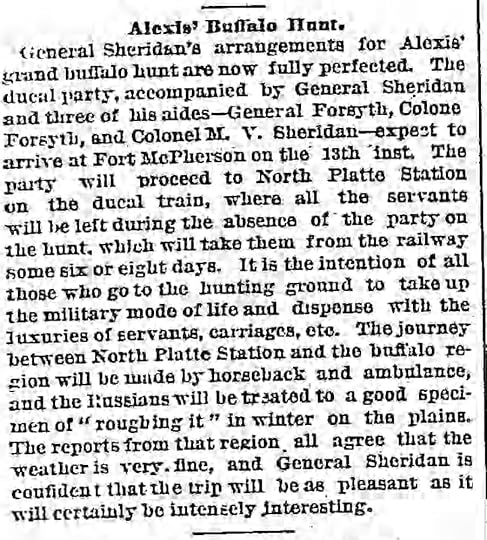
Meanwhile, Giuseppina Morlacchi's troupe was entertaining the city of Philadelphia at the Chestnut Street Theatre, where she was starring in the dramas Masaniello and The French Spy, as well as the comedy The Coming Woman. The Philadelphia Inquirer newspaper reported that the shows were interesting, but noted that the "chief charm lies in the grace and eloquence of Mddle Morlacchi's pantomime and the refinement of her dancing."
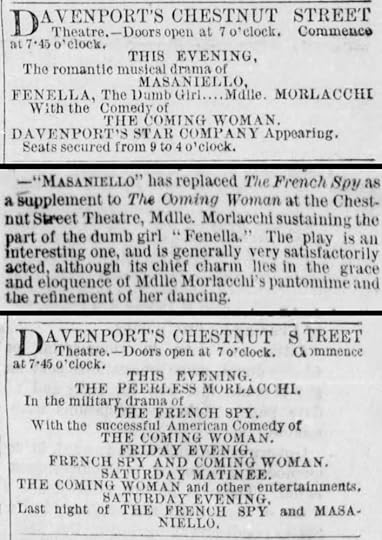
A note on the last page of the January 1st issue of Street & Smith's New York Weekly notified readers that E.Z.C. Judson, writing as Ned Buntline, was working with an "eminent dramatist" to turn his stories into plays, which he would" soon place ... before the public."
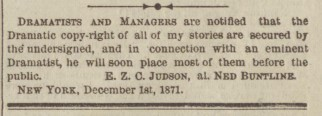
By the end of the year, Buntline's dramatic aspirations, the star power of the Italian danseuse Morlacchi, and the fame of the scouts Buffalo Bill and Texas Jack would combine in one of the most enduring popular culture experiences in American history.
December 23, 2021
The Centre of Attraction
In late 1878, Texas Jack and Doctor Carver prepared for a series of shooting exhibitions with a long stop in Wilmington, North Carolina. Jack had joined Carver, who he knew from North Platte, Nebraska, in a shooting exhibition in New York on the 4th of July. Carver immediately understood that spectators who had no idea who he was would come down to their local parks to see the famous cowboy turned scout Texas Jack.
Omohundro and Carver arrived in Wilmington, and the newspapers there reported that they would soon stage a shooting exhibition in the city. But within a couple of days, Carver left town to rendezvous with his new bride before shooting exhibitions in Augusta, Atlanta, and Macon. Jack took the opportunity to entertain the children of Wilmington, to hunt with locals, and to try his hand in shooting contests against some of North Carolina's best marksmen—with Jack coming out ahead the majority of the time.
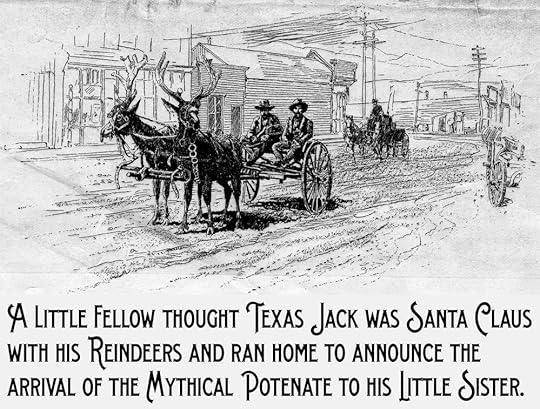
From the Wilmington Daily Revue, October 25, 1878:
The Centre of Attraction.
Dr. Carver and Texas Jack were the centre of attraction to the boys this morning until the elks appeared on the streets and then the doctor and his companion sank into mere nothingness in comparison with the horny-headed quadrupeds. A little fellow thought Texas Jack was Santa Claud with his reindeer and ran home to announce the arrival of the mythical potentate to his little sister. A farmer who was looking at the elks with all the eyes he possessed, viz. three pair in all, one natural and two of glass thought "by hokey, they would plow well."
Two Celebrities.
Dr. Carver, the famous shootist, and J.B. Omohundro, well known as Texas Jack, the Scout, arrived in the city last evening from Norfolk and are quartered at the Purcell House. Their arrival here has created quite a store among our people, who have often wondered at Dr. Carver's marvelous skill as described by those who have witnessed some of the feats which have justified his claim to be the champion rifleman of the world. The Doctor uses none but leaden pills but those he sends with so much directness that they always do their work very effectually.
Mr. Omohundro, or Texas Jack, claims to be a descendant of one of the old Indian tribes of Virginia. He is a Virginian by birth, but has passed the most of his time in Texas.
Dr. Carver leaves here tonight for Macon, Ga., where he has an engagement. Texas Jack will remain here until Dr. Carver's return, which will be about a week hence, when the two will give some exhibitions of their skill, Dr. Carver with the rifle and Texas Jack with the pistol.
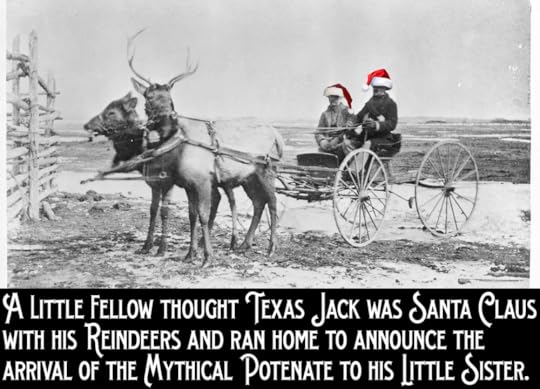
December 21, 2021
Alexis and Spotted Tail on a Buffalo Hunt
Looking back, it might seem inevitable that Buffalo Bill and Texas Jack would become stars. They were handsome, fearless, and photogenic. Ned Buntline had introduced them to the world in his dime novels, and news of their efforts pursuing Minniconjou raiders had been reported in papers across the country months earlier.
But the truth is that their meteoric rise to fame was the result of a very specific series of events—disparate trails and diverse people converging on the small frontier outpost of Fort McPherson, Nebraska, in 1872. In 2022 we celebrate the 150th (sesquicentennial) anniversary of the most remarkable and pivotal year in the lives of John B. Omohundro and William F. Cody. That year started with a buffalo hunt for one of the most famous and important men in the world.
This story comes from the December 15, 1871, issue of the Chicago Tribune. One year later, that paper would be advertising the premiere of The Scouts of the Prairie, proving just how far Cody and Omohundro would rise.
The Grand DukeArrangements for His Reception in This City.Two Floors of the Tremont House Secured for the Prince and His Suite.General Sheridan's Plans for a Grand Buffalo Hunt on the Plains---Spotted Tail's Indians Engaged to Assist.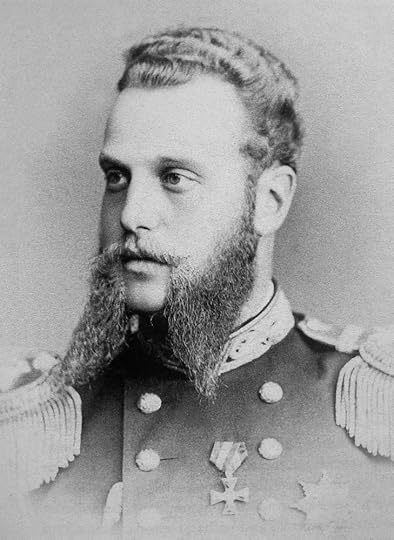
Of course, everybody knows that the Grand Duke Alexis is coming to Chicago. Such was his object in first planning the trip to America. To See Chicago as she was before the fire had been for years a desire of the Muscovite Prince; but to see Chicago after the fire was of vastly more importance to him, and he has been gradually molding his arrangements to the end that he might reach our city at a time when the great metropolitan wonder of modern times exhibited both the picturesque ruins of its former splendor and the remarkable spectacle of solid rebuilding in midwinter.
He will come soon after Christmas, and it is his express desire that his leisure may not be impaired by the wearisome formalities of a great public reception. He will submit to these inflictions at Milwaukee and St. Louis, which cities, having nothing in themselves of interest to anybody, are fain to supply their painful deficiencies by a grand splurge. In Chicago, Alexis has arranged to have his spare time to himself, in order that he may derive, by close personal examination, a fair idea of what the city really is and was. He feels, too, that it would not be just the right sort of thing for Chicago to divert from the funds necessary to restore the city, and provide for her destitute people in the meantime, the outlay which would be incurred by a big display in his honor, for he knows that if Chicago should undertake the reception business at all, she would not do it by halves, but would organize an affair which would cast wholly in the share all the attempts so far made in that direction.
Therefore, as has been said, His Imperial Highness will exclusively reserve for Chicago the honor of a visit solely of observation and interest, so that when he gets back to St. Petersburg and tells the "Governor" about his trip, he will say, in his frank and unaffected way, that there's some style to a city like Chicago, where the people let a fellow alone, and give him a chance to look around and learn something.
While in this city the Grand Duke will interpose his total extremities beneath Mr. Drake's mahogany at the Tremont House, corner of Michigan Avenue and Congress streets. Here to entire floors will be set apart for the imperial party, which Mr. Drake is advised will be made up as follows: His Imperial Highness, the Grand Duke Alexis; His Excellency, C. Catacazy, Russian Minister; His Excellency, Vice Admiral Possiet; His Excellency, W.F. Machim, Councillor of State; Count Olsoufief; Mr. B. Bodisco, Consul General of Russia to the United States; Count Shouvaloff; Dr. Condrin; Lieutenant Tudeer, of the Imperial Navy; and Mr. Shirkoff, Secretary of Legation, together with a retinue of light attendants. The apartments reserved for the party will be six parlors, with bedrooms and bathrooms adjoining, a private dining room for the Grand Duke and suite, and eleven bedrooms.
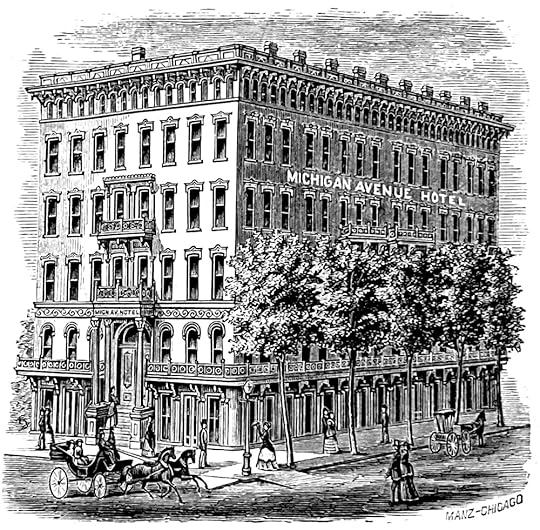
No extra effort at elaborate ornamentation will be made in the rooms, which will simply be rendered as elegant and comfortable as anybody could desire. Those of the Grand Duke will be in the northeast corner on the second floor, commanding a magnificent view of the lake harbor and the ruined portion of the South Division. Mr. Drake will exercise his accustomed good taste and judgment in providing for the comfort of the party during their stay, and it is fair to presume that they will not have to complain of having been lodged in a hotel conducted on the "burnt-out" plan. Alexis will pass a day in this city, thence going to Milwaukee for a day, then returning to remain another day here, and then departing for St. Louis.
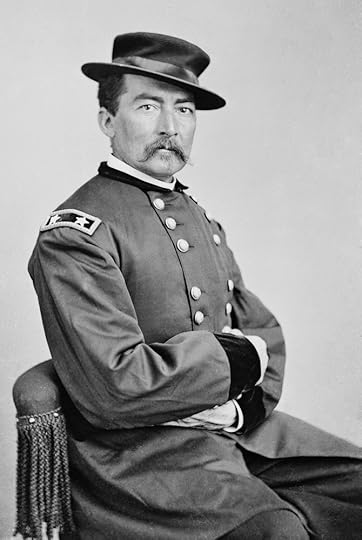
His course, thenceforward, is not fully arranged and will be affected by his conclusion as to the acceptance of General Sheridan's invitation to participate in a grand buffalo hunt on the plains. The General has already forwarded the proposition and now awaits a reply. It is his purpose to proceed, with the Russian party, and a few of his staff officers, by way of the Union Pacific Railroad to Fort McPherson, Nebraska, seventeen miles from Platte Station. This distance will be traversed in ambulances, and from the fort, the party will proceed sixty miles south, on horseback and by ambulance, to the point where buffalo now exist in almost unparalleled numbers. The camp will have been previously sent forward from Fort McPherson, so that everything will have been made snug and comfortable by the time the party arrive.
A thousand Sioux Indians, under Spotted Tail and Whistler, will be on hand to participate in the hunt, and to show the Grand Duke how buffalo are killed en regle. Such a spectacle has rarely, if ever before, been witnessed, and it is doubtful if its like would ever occur again. The opportunity is one worth a thousand times the trouble, and Alexis may rest assured that if he fails to avail himself of it he will forgo one of the most remarkable and interesting affairs conceivable. Some fears of unfavorable weather seemed to be entertained by the Grand Duke, but General Sheridan pledges his extended experience on the plains in going assurance that he will see to it that neither trouble, discomfort, nor delay arise on this account. He is in receipt of the following letter from the officer in command at Fort McPherson, under date of December 10:
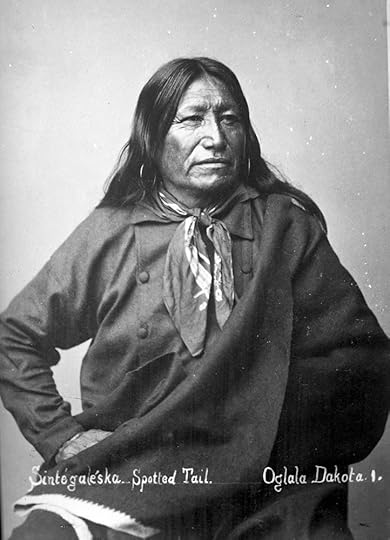
DEAR GENERAL: I enclose you a note from Mr. Todd Randall, agent with Spotted Tail. The weather is delightful here now. The days are almost as warm as Indian summer. Yours truly,
E.M. Hayes, Lieutenant U.S.A.
The enclosed letter, referred to by Lieutenant Hayes, is dated Black Wood, December 5, and is as follows:
SIR: Spotted Tail will meet the party coming at the crossing of Wilson Creek. Please inform me when the party will be there and I will have them in readiness. The Indians are all doing well and are perfectly satisfied.
Todd Randall, U.S. Sub-Agent
December 14, 2021
A Brief Interlude - Ice Storm
Back in the late 80s, I guess I was 8 or 9 years old, there was this old man that lived a street away from us. His name was Vet, or at least that's what everyone called him. I think his real name was Vester or maybe Sylvester. He and his wife Hilda had been friends with my grandmother before she died. I guess Vet had been some kind of engineer, maybe for Western Union.
Anyway, one winter there was a big snowstorm, schools closed for multiple days, kids sledding, all that. So I'm down on Black Oak Circle, where Vet lives, and he asks me if I want to help him with something. I was what is currently called precocious, but wasn't called that then, and I always enjoyed talking to and spending time with adults, even as a child. So I said sure and long story short we built an animatronic Santa sitting in a rocking chair on his front porch. I say we, he did it all and I helped in whatever menial way he needed, holding a wire, moving a rocking chair, whatever.
So this Santa had a wire running from the front porch to the mailbox, and any time there was noise at the mailbox...a couple talking as they walked by, a group of noisy kids dragging their sleds, a car driving past...the Santa would start to rock, raise its arm and wave, and say Ho Ho Ho. It was pretty remarkable at the time, and I remember seeing Vet on the local news a few days later when they did a short spotlight about it.
They actually interviewed me, not just about that, but about being out of school...oh wait, I just remembered...so after Vet did his Santa, the next-door neighbor did this huge snow sculpture of a dragon asleep, complete with scales and green food die. It was like 20 feet long. So the news was talking about both and I was out there so they interviewed me. The reporter at that time was a girl named Linn Yann, who had grown up in a Cambodian work camp. She and her family had been separated and forced to dig ditches and build roads and plant rice while foraging for berries and roots to survive. When the Vietnamese took over the camp they were at, they fled to Thailand or something and then were brought to America by aid workers. So in four years, Linn Yann goes from never having spoken or even heard a word in English to competing in the National Spelling Bee and almost winning. They made a Disney Saturday family movie about her called "The Girl Who Spelled Freedom." So anyway, she was famous locally, because she had fled to Chattanooga and lived here when she almost won the spelling bee and became a reporter for the local NBC affiliate.
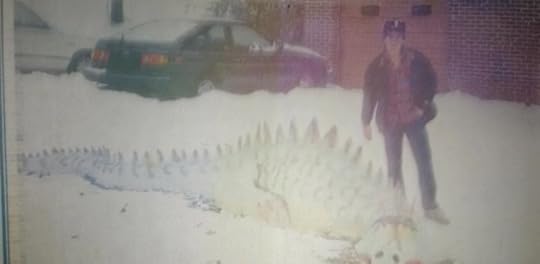
So she was doing this piece on Vet and his Santa and the neighbor and his big green snow dragon and all of the snow and the kids who were out of school because of the snow and since I was the kind of kid who hung around with adults involving myself in things like building animatronic Santas and such, she interviewed me and asked me what the best part of being out of school for snow was. In a spectacular display of foreshadowing my burgeoning dark sense of humor, and remember I was no more than 10, but I knew who she was so when she asked me what the best part of being out of school was, I looked her in the face and said before the viewing audience of the greater Chattanooga metropolitan area that I was just really happy I didn't have to take my spelling test.
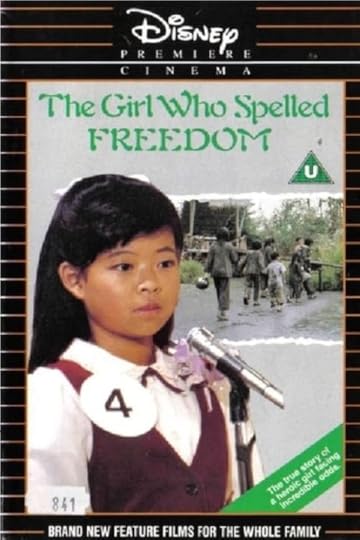
December 6, 2021
Ballerinas Of The Wild West
On December 16th, 1872, The Scouts of the Prairie premiered in Chicago. It was the first stage western, and it made its titular stars, Buffalo Bill Cody and Texas Jack Omohundro, two of the most famous men in the country. But that first night, and for many performances that followed, it wasn't a sure thing that customers would pay to see a western play or western scouts at all. That's why the show's writer and general manager Ned Buntline hired a bona fide sensation to star as the play's female lead.
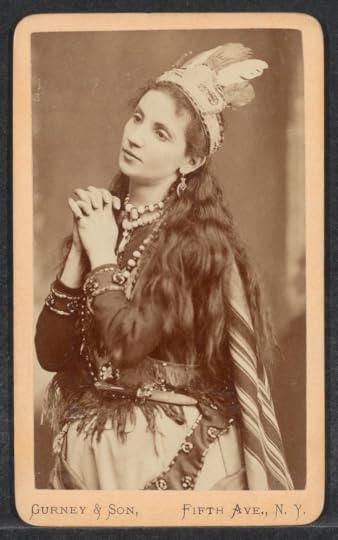
Giuseppina Morlacchi, sometimes called "The Peerless" Morlacchi, was an Italian prima ballerina who had starred in the greatest ballets on the greatest stages in the best ballet companies in the world. Trained at the legendary La Scala in her hometown of Milan, Italy, she toured throughout Europe, with periods spent in Paris, Berlin, Lisboa, London, and Rome. She was lured to America by the then outrageous guaranteed salary of $500 a night, brought to New York on the fastest ship ever to sail the Atlantic, and her legs were insured for the exorbitant sum of $100,000 (over $1.5 million in 2020) with Lloyd’s of London. She caused a sensation in Puritan New England when she introduced the cancan to America in 1868, though she was so respected and beloved that criticism was reserved for the dance and never the dancer, who even her worst critics called "an 'artiste' such as had rarely, if ever, been seen in America."
On stage, Morlacchi played the part of Dove Eye, who was actually the title character in the dime novel Buntline had released earlier in the year and based much of his play upon. If its hard to imagine a ballerina dancing on her toes while dressed as a "Indian Princess," once again any criticism was reserved for Buntline as the show's author, and never Giuseppina herself.
In 1949, 77 years after a prima ballerina played the role of a Native American, a Native American became a prima ballerina. Ki He Kah Stah Tsa, known as Maria Tallchief, was an Osage ballerina born in Fairfax, Oklahoma, in 1925. Maria's younger sister, Marjorie, was born the following year, and like her sister studied dance and became one of the most accomplished ballerinas in the world. Marjorie danced with the Original Ballet Russe, the Grand Ballet du Marquis de Cuevas, and the Chicago Opera Ballet.
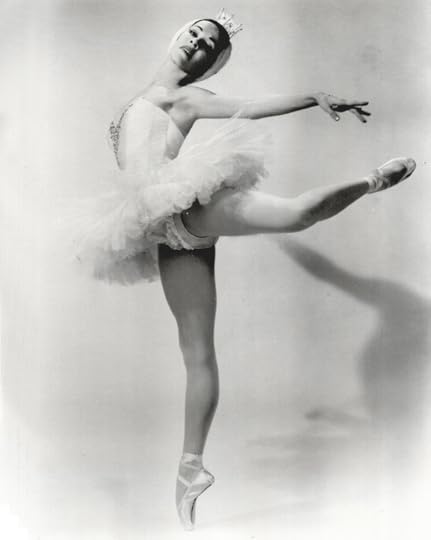
In 1957, she joined the Paris Opéra Ballet, the first American ever to become première danseuse étoile, the highest rank in the legendary company. The next year she became the first American ballerina since World War II to perform in Moscow's Bolshoi Theatre. Marjorie danced for Presidents Kennedy and Johnson, as well as French President De Gaulle. Tallchief was prima ballerina with New York's Harkness Ballet from 1964 until 1966, when she retired from the stage. Much like Giuseppina Morlacchi after her own retirement, Tallchief dedicated her life after retirement to education, sharing her knowledge and her passion with the next generation of aspiring ballerinas.
Marjorie Tallchief passed away on November 30, 2021, at the age of 95. She was the last surviving member of the "Five Moons," five Native American dancers from Oklahoma who took the international ballet world by storm in the 20th century. Along with Marjorie Tallchief, the Five Moons included her sister, Maria, Yvonne Chouteau, Moscelyne Larkin, and Rosella Hightower. The Five Moons were honored in their native Oklahoma in 1991 with a painting in the state capital rotunda.
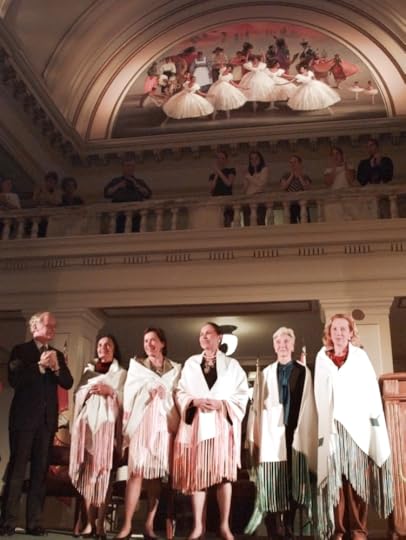
Within a generation of prima ballerina Morlacchi's debut as Dove Eye in 1872, life had imitated art in a more spectacular way than any novelist could have imagined. Five Native American women had become the greatest dancers in the world.
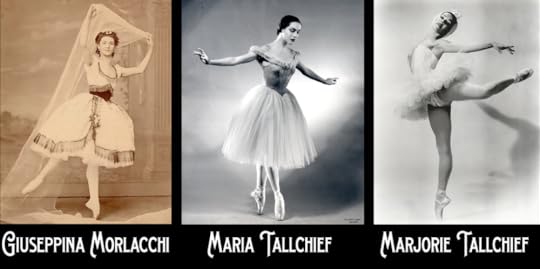
December 3, 2021
Texas Jack In the Timber Island
This long poem about Texas Jack is from the 1890 book May-Day Dreams, Passion Flowers, Poetic Flights and Prosy Thoughts by Sam Brown Jr., "the Cowboy Poet of the Platte."
Reading this one, a couple of lines stuck with me. "He was all that any maiden might wish for in the shape of man. Half cowboy and half scout, he seemed a youthful errant knight. Poor Texas Jack, how pure thy spirit was! The world hath judged, yet known thee not—hath called thee "wild," "inebriate." A mirthful, bold, but reckless scout, yet, oh, what melancholy and heartache were thine! How tirelessly upon thy track care, despair, and sorrow ever trod."
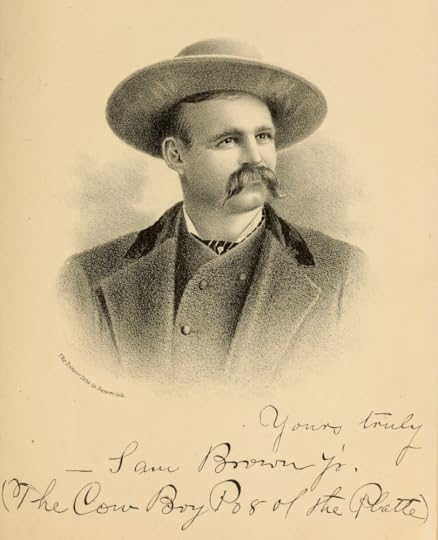 Texas Jack In the Timber Island,Or,Parted Lovers ReunitedPART FIRST.
Texas Jack In the Timber Island,Or,Parted Lovers ReunitedPART FIRST.The time was noon—a summer's day,
And all was still. The beetle's drone
Had died away; in silent sympathy
A stream went by, all hushed its wonted crooning.
The summer wind had ceased to sigh,
No answered once the fount's complaining.
A sense of rest was in the very air—
No song of birds, no hum of bees, no voice was there,
No cloud hung in the sky.
No hut, no habitation might you see—
No life, save yet one horseman, miles away
Across the prairie, moving wearily.
But who is he, and what his quest,
Who scours the plain, nor halts to rest,
When Nature's self lies thus, by sleep oppressed?
The steed was dark—a mustang fleet,
With taper limbs and racy head—
It was, indeed, a noble steed,
An o'er the prairie lightly sped
With graceful galop, proud and slow.
The rider was a handsome lad
Of sunny port and manly brow.
His hair was of a dusky dye,
And loved to cling in clusters brown;
His form was clad in clean buckskin,
With silk embroidered shirt and sailor tie;
A broad sombrero shaded perfectly
His high, white forehead from the sun.
Upon his foot the high-topped boot
Of jaunty cowboy fashion shown;
A lass dangled from his saddle horn,
And o'er his back, in handy manner flung,
A heavy, short, repeating rifle hung.
Two "double-acting" pistols and a bowie blade
Were belted loosely at his side,
And he was all that any maiden
Might wish for in the shape of man.
Half cowboy and half scout,
He seemed a youthful errant knight
Dreaming ever of his lady bright.
A laughing gloom was in his eye—
A sleeping shadow that did seem
The lingering image of some love-lorn dream.
But why delay? You all have heard
His name—his many a gallant deed.
And of the black steed that he rode
O'er many a dark and dangerous road,
Afraid of naught—the living nor the dead!
'Twas he—'twas he, that famous scout,
Bold Texas Jack, the "lightning shot!"
And lo! his course lay toward the wood—
That little, leafy, prairie wood
Or "island," as 'tis known,
Upon the prairie—a spring o'ergrown
With cottonwoods, wherever is
Sweet wild currants and red roses—
Where fruits and flowers ever be,
And all around the grass grows juicily.
A mile away,
In all its loveliness it lay.
That little, leafy, prairie wood,
That little, shady, silent motte,
A mile away—so cool, so shadowy—
A mile away—a lovely spot, indeed.
A mile away—
And winding by it,
Gleaming in the sunlight
Like a shining silver thread,
Like the fabled serpent of the sea,
That famous river wound—
The sunny, silver-bosomed Platte.
A mile away—so cool, so shadowy,
But lo! behold that rider and that steed!
Now have they marked the wood—the river spied,
And swifter—swifter o'er the plain they hie,
Till lo! the trees before them loom invitingly.
And now they halt—the saddle is thrown by,
The bridle stripped, the steed set free,
When, like two brothers of the desert hot,
They seek the shade, the well-spring cool and sweet.
Their thirst soon slaked, they hie away,
The beast to crop the juicy hay,
The youth to seek in bushes green
And coverts dark the crimson plum,
the currants, golden-hued and red,
The cherry bunches black and bright.
Thus fed, anon they seek repose—
The steed beneath the leafy trees,
The youth beside the gurgling fount,
Whose music, welling low and sweet,
Soon weaves a charm—a witched spell
That chains the very fibres of his soul.
Afar—dim as a dream—he sees
Or seems to see a shadowy concourse rise!
A spectre band—as slight as fays
Or Elfin men. They sink, they rise,
They dance before his half-shut eyes,
Scouring across the prairie bright,
Spurring their tiny steeds of white
Like demons o'er the infernal wild.
They hop, they skip, they leap, they slide—
Whole furloughs seems to glide
Behind at every stride.
But no sound is wakened by their hoofs,
For muffle is the coursers' tread
In the wild-flowers' buoyant bead,
And the eye alone—no other proofs
Point out the fact that every tiny spectre moves.
Yet hold! they hide—they flee!
They sink before his half-closed eye;
They fade out and grow dim—
They vanish like a dream,
And all that world is lost to him—
That fairy world—those phantoms grim,
And all is vanished and forgot,
Till lo! and once again
A happier vision glads his sight.
A wilder fancy yet—'mong far-off scenes,
By waters bright, he seems to sit
Upon the green marge of his native river,
In distant, flowery Southern lands—
the blue sky calmly bending over,
Himself a boy again, his childhood friends
Around him, and his heart's first choice
Sitting by him 'mid their summer trees.
Yet lo! and once again the scene is changed!
Amid the golden-colored flame
Of morning, by that same stream,
Silent with grief, lamenting all his days
With gun in hand, he seems to stand
Awaiting an order not to fire!
The word is given—both rifles flash
As one—loud rings the crash,
And lo! his foe lies bleeding there
Stark dead—yet he had shot to only wound,
And not to kill. He leaves the ground,
An exile now forever and forever more.
Beyond all words his soul is grieved!
A curse like his Cain never wore,
For he has killed—oh, heart bereaved,
The brother of the girl he loved,
And now he seeks the Western plain
All cheerless, and his soul forlorn
Poor Texas Jack, how pure thy spirit was!
Outlawed amid the scenes around thee,
Dreaming of home and concord sweet
Amid those tribes of blood—
Amid those savage scenes of border land,
Thy soul at variance with thy roving fate,
With thy wild life and hardy deeds,
Pining for love and soft hymeneal restraints
Amid the freedom of the lawless wild—
A land where Passion claims but Power for her lord,
And "man obeys no master but his mood."
Poor, love-lorn, dreamy Jack,
The world hath judged, yet known thee not—
The world hath called thee "wild," "inebriate."
A mirthful, bold, but reckless scout,
Yet, oh, what melancholy and heartache
Were thine! How tirelessly upon thy track
Care, despair and sorrow ever trod.
Alas! alas! poor boy, thou now art dead,
Deep in the mountain's bosom laid,
The Rocky Ranges tower in air—
Thy sky-kissed monuments forever.
There 'mid the storm hills, capped with snow—
There 'mid the highlands, wild and blue,
Calmly thy tired bones are sleeping.
O'er thy dust the pine-trees now are weeping,
And far away, singing plaintively,
The voiceful winds sing requiems of thee.
Alas, poor Jack, untimely dead,
Thou liest in they narrow bed,
Far from thy native land removed,
Among Virginia's purple hills no more—
No more beside the blue Atlantic shore,
No more amid the pine-wood's hallowed gloom,
No more the sunlit, rippled stream
At ever shall see thee coming home
Flown thy spirit is from earth forever;
Thy fancy's own, own happy hunting ground!
Departed, hapless scout, adieu!
Sleep soundly while to you
I build this artless rhyme.
Perchance a little time
The structure frail may stand,
Humble and perishable,
The hasty work of a careless hand—
And yet a little while
We trust it may endure,
Thy cenotaph and mine!
PART SECOND.In the island of the prairie,
In that little, leafy, shady wood,
Sleeping calmly, dreaming sweetly,
Cares and troubles all forgot,
'Mid his fancies roaming lightly,
still unconscious lies the Texas scout.
Now no more those demon legions grim—
Now now more those Elfin-riders trouble him,
Yet onward, onward still they come,
But earthly now—no longer airy
And phantom-lie—as in his dream.
Onward, onward still they come,
Onward o'er the prairie green and flowery;
Onward, onward in a line.
Like an oriental caravan.
Onward, onward, silent as the tread
Of camels o'er the desert's heated bed;
Onward, onward, like the Arab dry
When the spring of desert meets his eye.
Onward, onward, thirsty, weary,
Onward, onward, still they hurry,
Onward o'er the boundless, pathless prairie.
At an easy galop come they,
Gently rising, gently falling
With the undulations of the plain,
Like the wavelets of the ocean,
Like the billows of the main,
Like the roses of the meadow
When the zephyrs play among them.
Brightly show their guns and lances.
Brightly show the burnished badges
On their broad and dusky bosoms;
Brightly show their robes of purple,
Brightly show their robes of crimson,
Brightly show the beaded trappings
And the gold and silver mountings
Of their bridles and their saddles,
Gayly blending in the sunlight
With the verdant herbs and grasses,
With the laughing sky and mountains.
With the fragrant buds and blossoms
Of the wild and rolling plain.
Onward, onward still they come,
Panting ponies all a-foam.
Not a single respite take they,
Not a word or sentence speak they
As they hurry madly on.
Now their carriage seems more gainly,
Now their purple and their scarlet
And their gold-cloth and their samite
Shows more brightly in the sunlight.
Now their bearing seems more manly;
Now their airs grow pompous, stiff and haughty—
Yet, with distance fast receding,
And the prairie undergliding,
Freaks and features new are showing,
Freaks and features fierce and wild,
Features until now concealed
In the hot and sultry air.
Freaks such as the kings of India think fair,
Freaks such as chiefs of Arabia doth wear,
Freaks and features until now beveiled
Like distant peaks impaled
In cloudy waves of gossamer.
Robes of richest color,
Arms for fiercest valor,
Bright plumes above them waving,
Light steeds beneath them foaming,
And the war-paint on their faces
Gives the savage many graces
Envied by the Eastern races—
By the forest beaters,
By the lotos-eaters,
By the tireless ostrich-chasers
And the lazy harem-keepers.
PART THIRD.In the island of the prairie,
By the fountain cool and sweet,
With the cloudless sky above him,
With the pathless plains about,
Dreaming now no more of elf or fairy,
Calmly sleeping lies the fearless scout.
Dreaming now no more of hopes too bright,
Of Courtship vain or broken plight,
Or heated game or deadly strife,
Or lady fair he might have won,
And many a sunny Southern scene
And frolic wild—forgotten never,
Fandangos by that Mexican river,
Deeds of daring done in strife,
At cowboy tournaments and feats
Of horsemanship—all real as life,
Before his vision passes now no more.
Nor does he view the sad, sweet past revealed again
In all the weird light of dim phantasy,
Nor does he live those long, long, summers o'er
As in his dreams erewhile he did,
Believing they were but the hours of a day;
Nor does he heed him now once more
The savage pageantry upon the plain,
Yet onward, onward still they come,
Silent as the executioners of doom,
Heading for the island of the prairie,
heading for the oasis so green,
With its bowers fresh and shady,
With its fountain cold and crystalline—
Onward, onward, till at last they stand
Upon the green brim of the fountain,
There to find refreshment—not the scout,
Yet, though strange to tell, he lay there still,
Just hidden by some friendly roses.
Nor did they once observe his steed
Joined by their courses in the wood,
But seated close around the fountain sparkling
They hear naught else besides their Chief's harangue.
THE CHIEFTAN'S HARANGUE.
"Children of the prairie,
Minions of brave Sitting Bull,
Yours is to obey me
As you would your master's will.
Yours is to blindly follow
Wherever I may lead—
Yours is to blindly follow,
Though the bullets may fall like seed;
Yours is to blindly follow
Though the blaze of battle,
Like the white man's Hell,
All around us flares up.
Yours is to die and serve me;
Yours is to shelter and defend;
Yours is to remove me,
Should the blade of battle wound,
To some shelter in the hills.
If some hostile bullet kills, Yours is to consign me
To the green and grassy ground.
"Brother, warriors, red men,
Harken well to what I say.
Far off upon the swelling prairie
Comes a long, white wagon-train—
Comes a band of crafty white men,
With their women and their children,
With their white flocks and their cattle,
With their mule-teams and their horses,
With their tame ducks and their hen-fowl.
You can see them coming—slowly coming—
Coming at a snail's pace—
You can see their lazy oxen
Slowly moving o'er the prairie;
"You can see their wagons in a long line
coming straight on, this way,
Gliding like a flock of white swan,
Like the marsh-birds of the northland,
Like the clouds that sail the heaven,
Like the while hills of the snow plain,
Like the hills that float so high up
In the great, big, blue, boundless sky sea,
Like the white canoes seen on the big sea-water,
Like the steamboats of the great Atlantic,
Like the war ships seen by our head men
When they went to Congress—Washington,
When they went to see the gray-haired Fathers
Of the pale-face so accursed.
"Oft, my warriors—oft, my brothers,
Oft such sights have seen you,
But not upon this grass plain,
Not so far out here to the northward
Have you ever seen so many pale-faces
With their wagons and their cattle,
With their women and their children.
Much you wonder, brothers;
Much you ponder, warriors;
Much you think of such things—
Of things so strange and unusual.
I have warned you, brothers—
I have reasoned with you,
Now I wish to tell you wherefore
The white man brings his 'house' among us.
"You are well aware, my brothers,
Of the richness of the mountains,
Of the gold and silver treasures,
Of the wild and rugged hills,
Of the precious metals hidden
In the hills far to the westward—
In the happy, hallowed hills;
In the hills so wild and dreamy;
In the hills so bright and purple;
In the silent, sleepy hills,
With their dells so green and grateful;
with their fountains cool and crystalline;
With their banks of silver-shining snow;
With their lakes of heavenly beauty,
And their skies of loving, laughing blue;
With their plateaus green and grassy;
With their valleys full of flowers;
With their bee-enlivened copses,
And their bird-enchanted bowers;
With their blossom-tufted bushes
And their stately forest trees;
With their spruce trees and their birches;
With their cedars and their song-pines;
With their light and graceful willows
Waving o'er the broad and rushing river,
Waving o'er the dancing, dimpled water,
Waving o'er the silver-shining stream
With its rounded stones and pebbles,
With its mossy banks and islands,
With its foamy falls and cascades,
And its lovely vistas in the forest.
"Brothers, warriors, red men,
I would kindle your imagination;
I would stir your hearts to action;
I would fire your lively fancies
With these dreams of sweetness,
With these thoughts of beauty,
With the image of the valley,
With the vision of the mountains—
Of those hills so cool and purple,
Of those hills so wild and dreamy,
Where grow the trees of petrifaction,
Where grow the opal, and the agate
And the gems of rosy lustre;
Where the deep and rocky caverns
Ever dwell in gloom and darkness,
Where the wild and narrow gorges
And the deep and foaming canons
Plow great furrows through the mountains.
From the desolate abysses,
Where the dashing, reckless cascades
Thunder downward through the valley,
Downward through that old, enchanted valley
By the ' fire-hole ' and the ' mud-springs,'
Past those ' fountains of hot water,'
Where the booming, steaming geysers
Spout their columns into mid-air.
Wondrous columns—pillars white as snow,
Pillars like those marble shafts seen in the temples—
In those gorgeous temples of the pale-face—
Pillars like those door-posts of the White House
Of the great White House of the head man,
Like those lodge-poles seen by your Chieftain
When he went to Congress—Washington.
"These are the scenes, my warriors,
That I would portray you.
These are the beauties of our nation;
These are the dowers of our fathers;
These are the glories of our country—
Of that land of peace and plenty,
Of that land of milk and honey,
Where the forest abounds with wild-fowl,
Where the rivers swarm with fishes,
And the meadows teem with sting-bees—
Where the bison and the 'wapitas,'
Where the ' prong-horn' and the' black-tails'
Roam in countless numbers;
Where the coney finds his quarry,
Where the eagle builds his eyrie,
Where the quail-bird and the rabbit-of-the-snow
With the seasons shed off and change their hue ^
Where the siver-tip and black bear,
Where the grizzly giant and the puma,
Where the mountain-wolf and wild-cat
Live together peaceful, tame and mild-eyed.
"There, my warriors—there, my brothers,
There the fox-grape grows most luscious—
There the wild plum and choke-cherry,
There the black-cap and the red raspberry
Ripen with a spicy flavor;
There the ' quallah ' grows most juicy,
There the 'camus' sweet and luscious,
There the servis is most mellow;
There the currant and squaw-berry
Ripen into golden yellow;
There the tarty yerba buena baubles
And the lowly, modest huckleberries
Purple all the hillsides.
There the killickinick and ivy
Hang with green and crimson festoons
All the walls and fissures of the mountains.
"There, my brothers—there my warriors,
There the roses wait us;
There the wild-birds greet us;
There perfumes delight us;
There the rivers, rushing by,
Lull us with their melody.
There the water-lily,
With its petals snowy,'
With its calyx golden,
Dwells in all its chastity—
Dies in all its purity.
There the honeysuckle
With its pipes of crimson,
With its cups of treacle,
Where the grizzly giant and the puma,
Where the mountain-wolf and wild-cat
Live together peaceful, tame and mild-eyed.
"There, my warriors—there, my brothers,
There the fox-grape grows most luscious—
There the wild plum and choke-cherry,
There the black-cap and the red raspberry
Ripen with a spicy flavor;
There the ' quallah ' grows most juicy,
There the 'camus' sweet and luscious,
There the servis is most mellow;
There the currant and squaw-berry
Ripen into golden yellow;
There the tarty yerba buena baubles
And the lowly, modest huckleberries
Purple all the hillsides.
There the killickinick and ivy
Hang with green and crimson festoons
All the walls and fissures of the mountains.
"There, my brothers—there my warriors,
There the roses wait us;
There the wild-birds greet us;
There perfumes delight us;
There the rivers, rushing by,
Lull us with their melody.
There the water-lily,
With its petals snowy,'
With its calyx golden,
Dwells in all its chastity—
Dies in all its purity.
There the honeysuckle
With its pipes of crimson,
With its cups of treacle,
With its chalice dewy,
Tempts the wild-bee—
Tempts the flower-fairy
From his tepee on the prairie.
"There, my warriors—there, my brothers,
There have we dwelt since childhood.
There our fathers dwelt before us;
There our children play and prattle;
There our sweethearts wait to meet us;
There the old folks wait to greet us;
There our wives prepare to banquet us—
But the pale-face, he would rob us
Of all this gladness—all this bliss.
"Aye, brothers, warriors, red men,
He comes our land to plow and fence up;
He comes our game to chase and slaughter;
He comes to muddy all our running-water;
He comes our trees to cut and chop down-;
He comes our shrines to pilfer and destroy;
He comes our catafalques and grave-yards to desecrate;
He comes our head men to depose and murder;
He comes our wives and daughters to dishonor;
He comes ourselves to laugh and jeer at;
He comes to steal our gold and silver;
He has broken his pledged word and treaty;
He has dared to insult our great nation;
He has come, defiant of our arms and power;
He would pack off—if he could—our whole country.
"But, brothers, warriors, red men,
Such wrong as this shall never be!
Himself, instead—his women, children, all shall die!
Oh, hearken, warriors! listen, red men,
Catch well on to what I say.
Here, hidden in the bushes, we will lie
To shoot and cut him when he comes up—
Oh, so grandly—so very scientifically!
"Much stock he has, you all know;
Much whiskey, coffee and tobacco;
Much sugar and molasses—ha! ha!
Much beans and bacon, flour and corn-meal also;
Much fruit and other good things—oh, my!
How you like it—how you long to taste it—so much!
You shall have it—it yours shall soon be;
You shall go home filled up—well, how delightful!
We shall all get drunk—oh, mighty-much drunk!
We shall all be rich men—whoopla! ha! ha!"
PART FOURTH.Thus planned those children of the prairie—
Those painted sons of Ishmael,
Descended from old Harry
And his wife—Anaconda Sabina Cain,
Daughter of Nod, and Queen of—well,
No matter about the name of that hot place.
Suffice it, thus planned those Aborigines
Whose quest was plunder, pillage, gain.
Thus planned those robbers of the desert
Who have no pity, and who know not
Truth, religion, virtue, shame.
Thus planned those outlaws wild and red
Who revel in destruction, and delight
In torture—murder—blood.
Thus planned those Parsees of the Platte
Who rather shoot than to be shot—
Who prefer in ambush deep to lie,
To shoot the white man passing by;
Or follow, snake-like, on his track
For months—to strike him in the back.
But peace, my Muse! I meant not
Those savage frailties to deride—
Although I did, I guess—
They have their faults— and virtues—good and bad.
Their ways are artless, and their board
Is frugal—sometimes rather scant.
They don't get drunk—that is, when they can't.
But peace—I care not my dull pen to cross
With their sharp spears—'tis mine to limn
The truth, yet paint their virtue—not their sin.
In the island of the prairie,
With the pathless plains about,
Scheming—planning—making merry,
Sat that painted robber brotherhood—
Sat those favored children of old Harry,
Awaiting yet the hour of pillage and of blood.
There, too the scout lay dreaming—
Still by chief and warriors noticed not.
For o'er his couch the flags and bushes, nodding,
Hid his shapely form from sight.
But stay! what sound is that—what sight—
That makes each savage eyeball glare?
Behold—across the hot, dry plain afar,
The long white wagon-train appears at last.
And hark! the shouting, barking, braying,
As rumbling, rolling, jolting o'er the plain they come—
Happy hearts a-throbbing,
Heated lungs a-panting,
Parched lips a-parting,
Thirsty tongues a-starting,
On they come—on they come,
Man and team,
Racing, flying,
Longing, languishing
For the shade-tree and the spring.
Oh, that man far-seeing,
Oh, that woman cunning
Could look into the dim futurity—
Could read the fate that is to be.
Could shun the grave their too hasty steps are nearing!
But no! Life's book is sealed beyond all power of reading—
And it is better so—for were our doom not hidden well,
My God ! what fear our hearts were daily dreading—
What agony our quaking spirits then should feel.
In the island of the prairie,
Hiding 'neath that blessed shade,
Lay those red-skinned children, waiting
Their white-faced brethren to shoot.
In that island of the prairie
Now no longer slept the scout,
But wide-awake—so witty, sly and cunning—
He was creeping softly toward his steed.
Meanwhile, across the prairie hot and glowing,
The long, white wagon-train comes speeding on.
Panting dogs are barking,
Foaming cattle lowing,
Fretful children crying,
Peevish maidens sighing,
Boys laughing, singing, shouting,
Silent man and woman uncomplaining—
What a babble! what a rattle!
Rumbling of wheels and bellowing of cattle.
But hark ! what other sound is that?
Crash of firearms—noise of battle!
Patter—clatter—tramp of many feet!
Shouting voices! flying steed!
Indian ponies a-stampede!
Pursuing horseman—minus coat and hat!
"Lie down," he cries; "Haste! keep out of sight!
Make ready to give them bowie-knives and lead!"
Thus calls out Texas Jack, as merrily
He galops by, shouting, yelling lustily,
Those Indian ponies to affright.
But all too late—too late
The warning call is given!
As lurid as the bolts of Heaven,
As dire and as deadly
Those Indian rifles flash and volley,
Raining hissing leaden-messengers about!
Already scores of slaughtered cattle heap the bloody sod;
Already nearly half that pale-face band is dead;
Yet onward, like the whirlwind's devastating blast,
Those red-skin furies pour, in howling legions, past,
Striving those frightened cattle and their masters to surround.
And him—my God!—not here to succor and defend!
Borne lightly by upon his mettled steed,
Loudly shouting those ponies to affright,
The scout had sped along—scarce conscious of his need.
But now, the stampede nicely done,
He hurriedly returns to join the fray.
And see! how like a centaur he sweeps down,
A deadly fire-stream pouring from his gun!
Right into the thickest of the fray he flies—
Right where the pattering bullets hiss!
Unscathed himself by ball or blade,
He scatters death and panic in his road.
Encouraged now, the whites pursue his lead,
While, put to rout, the reds fly for the wood,
Into whose depths they shortly plunge—
Pursued by foes who seek revenge—
Pursued by foes whose pistols flash
Right at their backs, so close the range.
Yet on and on—till, closing hand to hand,
Their bowies reek with Indian blood—
Till lo! thank God! the last red foe is dead!
Then, proudly trooping from the wood,
That handsome scout still in the lead,
How loudly, gladly rings their exultant shout!
To meet those brave and hardy men,
Forth from the train the women run;
Their daughters, too, and children fair
Join in the race and hurry there,
And, though full half their kin is dead,
How blissful sweet it is to meet
Some dearly loved one, living yet.
And stay—whose snow-white arms are those entwined
That brave defender's neck, so close and lovingly about?
'Tis she—'tis she! his own—his Nellie bright!
And see! there stands her brother, too, unhurt!
"Thank God !" cries Texas Jack, " and so
My bullet only ' winged' you as I meant it should?"
"It did, indeed," the tall and handsome lad replied;
'And now, my brother Jack, I humbly plead
Forgiveness for my folly and the wrongs I did."
"You are forgiven, Frank—but pray,
Why did you challenge me so discourteously,
And. so unprovoked, too?" "Ah, yes,"
The tall and manly boy replied,
"I had forgotten in my joy to mention that.
Vile men had lied to me, and said
That you were ' but a gambler and a fraud,'
And that you 'loved my sister not, but wished to wed
Her only for her beauty and her gold.'
And that ' when one was gone and the other spent,'
You would ' desert her for some other maid.'
Or, mayhap, murder her, as you had dene
In other instances, they said.
Therefore I challenged you, and shot
To kill, but missed, myself to fall,
Not dead, but stunned. Yet you were told
That I lay lifeless. So you fled
To this wild land—unconscious of the truth, I see."
"Quite true, indeed," laughed Texas Jack, " for lo!
I knew that Nellie could but blame and banish me
For my unhallowed deed. But now, thank God,
We meet again, and as friends, Frank Ironhand,
While Nellie dear has promised soon to be my bride."
And now my tale is told, reader dear,
My presence is required otherwhere—
Adieu! With pleasure, I will meet you later.
November 30, 2021
Otto Franc
Texas Jack led four groups of European aristocrats on hunting expeditions in Wyoming, Montana, and Colorado. In all four cases, those aristocrats returned to either buy land or invest in livestock management during the cattle boom that began shortly after Omohundro's death. The last of those men to make the Western trek with Texas Jack was Count Otto Franc von Lichtenstein, and he became the only one of those men to not only invest in buying Wyoming land and filling it with cattle but to actually live on and run the ranch he started.
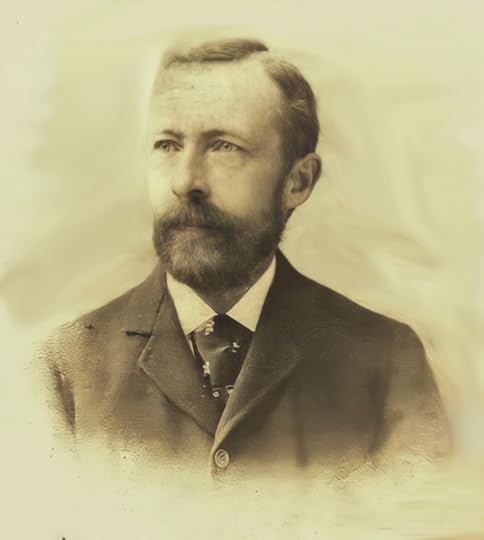
We covered Franc's trek with his friend Amandus Ferber under the watchful eye of Texas Jack in detail earlier this year. They began in Rawlins, Wyoming, and traveled south for a few weeks before restocking and heading north, passing through the Wind River Canyon and into the Bighorn Basin to hunt deer, elk, antelope, and buffalo. In his journals, Franc marveled at the abundance of wildlife feeding on the tall grass of the basin. He asked his guide if he thought the region would be well suited for raising cattle, and Texas Jack told him that in his experience cattle could thrive anywhere buffalo could. When the trek was over, Franc returned home, got his affairs in order, and went back to the Bighorn Basin where he broke ground on his first cabin on the Greybull River, a tributary of the Bighorn River, near present-day Meeteetse.
In the course of running the ranch, Franc hired a pair of young men named Robert Parker and Al Hainer. After three of Franc's horses disappeared, the pair were arrested. Hainer was acquitted, possibly because he testified as a witness against his friend Parker, who was convicted of the crime and sentenced to the Wyoming State Penitentiary. Parker was pardoned by Wyoming's governor three years later, but while serving time he became convinced that he could make more money as a full time criminal than as a ranch hand. Using a nickname from his time as a butcher in Rock Springs, Wyoming, and the surname of a cattle thief he had worked with named Mike Cassidy, Butch Cassidy formed the Wild Bunch and began the most successful train-robbing spree in history.
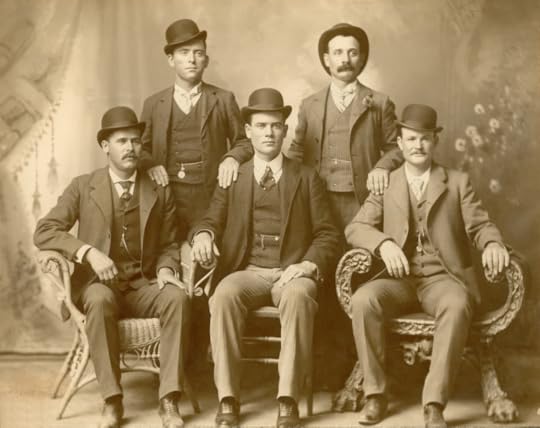
From that single cabin came the Pitchfork Ranch, one of the most important and iconic western ranches in American history. Franc ran the Pitchfork for the next thirty-three years, and turned the ranch into one of the largest in the state and himself into one of the most powerful of Wyoming's cattle barons. According to Pitchfork's own history, it at one point encompassed seven ranches and 250,000 acres and ran 10,000 Hereford cattle and 20,000 Rambouillet sheep. Years after Franc's death, the ranch was visited often by Charles Belden, a photographer who documented ranch life in a way that immediately caught the public imagination. His photographs of life on the Pitchfork graced the cover of Life magazine and remain some of the most iconic images of cowboys and ranch hands in the early 20th century. Later, the ranch was used as the backdrop in one of the most effective and memorable ad campaigns in modern history, with hard-working cowboys on horseback taking a moment to enjoy a smoke, letting you know that this was Marlboro Country.
[image error][image error]The Pitchfork remains a working cattle ranch. The Baker family, who have owned the ranch for over a decade, say that "Our focus for the future of the ranch is to build our quality commercial herd to offer ethically raised beef from our pasture to your plate. Although our primary focus is raising cattle we understand the importance of being stewards of the land so that we can leave the soil, grasslands, and water resources better than we found them." This attitude pays tribute to the intertwined commercial and conservationist themes that have been present in the ranch's management from the beginning, from the careful planning of Franc, the advocacy of Belden, and the discovery of the black-footed ferret on the ranch in the 1980s, well after they were thought to have gone extinct.
Otto Franc died on November 30, 1903, and many in the area believed then and maintain now that he was murdered. His body was found alone next to a fence on his property with a double load of buckshot through the heart. Sadly, this experienced rancher and cattleman was the victim of an unlikely accident. The Billings Gazette explained the situation:
News was received here last night of the accidental death by shooting of Otto Franc, one of the large and well-known stockmen of the Big Horn basin, which occurred sometime yesterday afternoon.
Mr. Franc, who resided on his ranch, about 15 miles from this place, was killed by the discharge of his own shotgun. At about 2 o'clock in the afternoon, he left home for the purpose of coming to a corral some distance from the ranch house, where he was feeding some cattle, taking his gun along. In going to the feeding pens it was necessary for him to pass through a wire fence, at the door of which his body was discovered later in the day.
As he failed to return within the time supposedly necessary for him to visit the corral and get back to the house some of his employees went in search of him, eating that he had met with an accident. They followed the trail usually taken and found Mr. Franch's remains lying near the fence, with his shotgun beside the body. From all appearance, he had attempted to pass through the fence by crawling under the lower wife and after he had emerged at the other side evidently tried to pull the gun after him, with the muzzle toward his body. The hammers seem to have caught in one of the wires, as both barrels had been discharged. The two charges entered the body near the heart and death must have resulted almost instantly.
Mr. Franc was a gentleman of the old school, kindly, sociably and generously disposed to all with whom he came into contact. By reason of his amiability of disposition and uprightness of character he made many warm personal friends and enjoyed the well-merited esteem of all that knew him. As a businessman, he was successful, and at the time of his death by thrift and the exercising of good judgment had amassed a generous share of this world's goods. He was never married and had no relatives in this part of the country.
Franc turned a single trip west with Texas Jack into a successful business and a sprawling ranch that remains active almost 150 years after its founding. The town of Otto, Wyoming is named for him, as is Francs Peak, the highest point in the Absaroka Range, but his legacy extends deep into the way we view ranching and the American West.
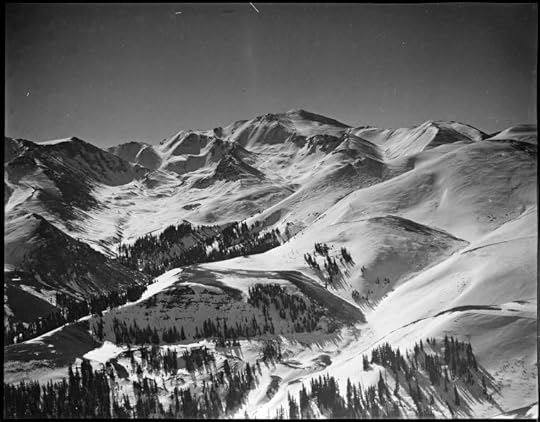
November 25, 2021
Thanksgiving 1875
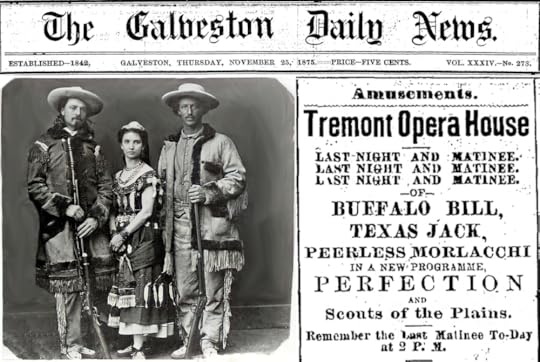
On Thursday, November 25th 1875—Thanksgiving Day—families in Galveston, Texas, could go to the Tremont Opera House and enjoy a 2 o'clock matinee performance by Buffalo Bill Cody, Texas Jack Omohundro, and "The Peerless" Morlacchi in their show The Scouts of the Plains. The tour had kicked off in Philadelphia back on August the 18th, 1875, and would hit over 100 cities before it finally ended on the 3rd of June in Wilmington, Delaware. The packed crowd watching the afternoon show in Galveston was unaware, as were the stars of the show, that this would be their last tour together.
By that final show, Texas Jack and Buffalo Bill had been on stage together for four years, and put on as many as a thousand performances. But their shows in Galveston, San Antonio, and Houston in November of 1875 would be their only performances in the state of Texas. For Texas Jack, who bore the name of the state proudly, it was a kind of homecoming. Jack introduced Morlacchi, his wife, to many of his Texas friends, including some of the cowboys he had shared dusty trails and cattle stampedes with. Shows in all three cities were packed with people who knew Jack "back when," and were eager to prove they knew the famous scout to their young children.
Jack had arrived in Texas shortly after the Civil War, though he was forced by the shipwreck of his boat from New Orleans to work as a teacher on the Florida panhandle for a short period before he could hit the open range. His first job was as a cook for the older cowboys at Sam Allen's ranch, near Houston, but he quickly traded his cast iron for a big iron and the chuck wagon for a fine horse. He became one of Allen's best and most trusted cowboys, and may have helped drive cattle from Houston to Galveston, where they were loaded on boats bound for Cuba. Between his work at the Allen ranch and the vast herds of his next employer John Taylor's big Bexar county ranch, The Chisholm Trail and others like the Goodnight-Loving Trail, Shawnee Trail, and the Western Trail became as familiar to Jack as the Virginia countryside of his youth by the time he turned in his spurs for the life of a government scout in Nebraska, his friendship with Buffalo Bill, being made famous in the dime novels of Ned Buntline, and the life of a stage star he now so thoroughly enjoyed.
So as you watch Macy's parade or a handful of NFL games this Thanksgiving, remember that once upon a time you could have gone down to your local theater on Thanksgiving Day and seen Texas Jack and Buffalo Bill! I bet that was a Thanksgiving those lucky few never forgot.
November 22, 2021
The Scouts of the Prairie In Boston
From The Boston Globe, March 5, 1873:
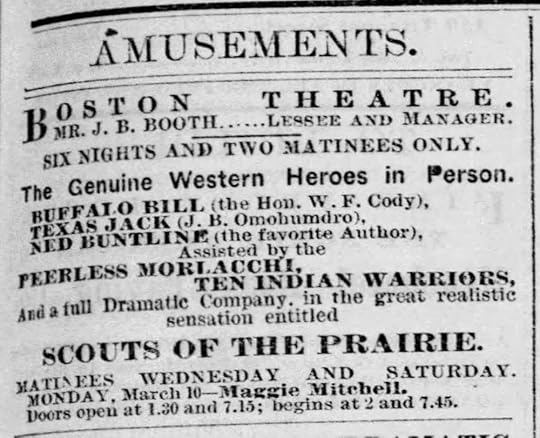
There was a very large house assembled Monday night to see the debut of Buffalo Bill, Texas Jack, and Ned Buntline. The audience was, in the main, composed of the sterner sex, and these were principally of that class whose propensity it is to give vent to the throes of rapture that fill their souls through the agency of cat-calls, yells, whistling, and howls, varied occasionally by a rhythmical stamping of feet en masse. In other words, the great unwashed sympathetically came forth in force to see mimic scalping, shooting, tomahawking, and indiscriminate butchery. There were impatient of aught that did not savor op rapine, bloodshed, or violence. The entertainment they crowded to witness was tame in comparison to their own performances. The former was repulsive enough, but the latter were much more objectionable. But even this audience found the piece too outrageously overdrawn, and they frequently expressed their disapprobation by bellowing at the performers and ridiculing the action. The exhibition, on both sides, was laughable enough, but it was, at the same time, oppressively painful. when the establishment in which it took place is taken into consideration, we know of no work that will so fittingly apply to it as "shocking." It was brutal, commonplace, and disgraceful. Grassy Chief, Prairie Dog, Big Elk, and Water Chief, Indians who accompanied Buffalo Bill and his companions hither, must have been astonished at the wild shrieks and the demonstrative unruliness of their paleface masters in the audience, and could have learned but little respect for that superior civilization of which they had doubtless heard much on the plains of the Far West.
The plot of "The Scouts of the Prairie" is one of those mysteries that must remain forever unsolved. In fact, the piece is too ridiculously absurd to merit serious mention. It is just such an affair as an excitable and romantic schoolboy might write after having become thoroughly saturated with dime novel literature. There is a trapper named Cale Durg, played by Mr. Buntline, the gifted author himself, who has but little to do but to get captured by Indians and released by Buffalo Bill and Texas Jack until he is at length shot. In consideration of the fact that he is given to delivering moral lectures of an almost interminable length, his death at the end of the second act proved one of the few really agreeable incidents of the piece. A discourse upon the evils of drinking lasted so long and proved so dry that there was quite a little exodus at it conclusion, in quest of liquid refreshments. The lecture was rather calculated to drive an unhappy drunkard into driveling idiocy than to reform him. This Cale Durg wore a superb black, curly wig, with brows to match. He took up as much time in dying as he did in lecturing, and the audience were so exasperated by frequent false alarms that, when he at length gave his final grasp, the pent-up feelings of the entire gallery broke forth in a demoniacal yell of rapturous and uncontrollable jubilation. For our own part, we did not feel he could be depended upon to remain dead until the curtain had finally fallen upon him. A terrible fear haunted us that he would appear in a subsequent act to deliver more lectures, either in his own proper person or as a pious, avenging ghost.
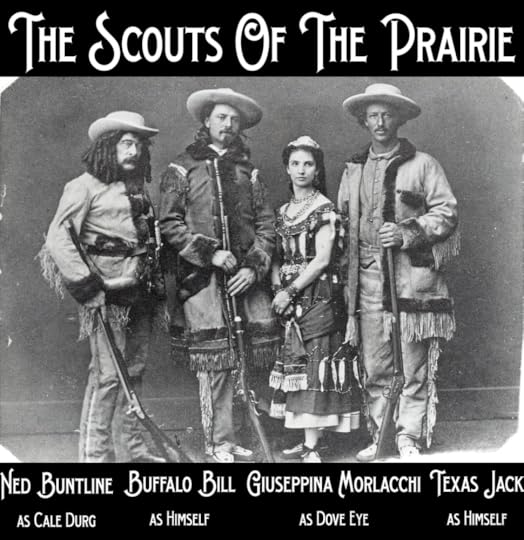
The Hon. William F. Cody is a fine-looking fellow, but the share he took in the piece was principally confined to rushing on the stage at critical moments and firing off two very handsome revolvers. His great effort was shooting and scalping an Indian, and, after picking him up with one hand by the waistband, bearing him off with the most perfect nonchalance and firmness of muscle. It quite eclipsed the striking effort of the late Edwin Forrest in "Damon and Pythias," where he was accustomed to swing his faithful slave about like a walking cane. Mr. J. B. Omohundro, or, in other words, "Texas Jack." has but little to do but lasso a couple of Indians and wear a hunter's suit with an easy and becoming grace. The Indians crawled about on all fours and smelt the stage, and listened for nothing in particular, after the immemorial custom of stage Indians. They were all killed at the end of each act, only to reappear safe and sound in the next. There is an Indian chief, Wolf Slayer (Mr. W. J. Fleming), who has much to say about "Fiyah Wotter," which he pronounces: "The cuss of the red—er man, as well—er as the pale—er face." There is some ambiguity in the wording of this sentiment; but as it conveys a truth in either of the senses in which it may be taken, we are not disposed to criticize it very closely. It is hardly necessary to say that some of the English spoken in this piece is of a peculiar nature. We have space for but one example, but that is a choice one, and is as follows: "They ain't no little squaws around here, is they?"
There are two heroines in the play, one of whom is named Hazel Eye, and the other Dove Eye. Hazel Eye is played by Senorita Eloe Carfano, and Dove Eye by Mlle. Morlacchi. As they both speak English with a marvelous foreign accent, the scenes wherein they appear together are remarkable from a polyglot point of view. There is a glorious broken English scene in the second act. Hazel Eye is a female trapper, who loves and is beloved by Texas Jack. She distinguished herself on Monday night by a "poetic tribute to Cale Durg," which lasted somewhere in the neighborhood of half an hour, and consisted of nearly a score of verses, each of which begins with the gratifying but somewhat perplexing intelligence that "he was born in March." Every other sentiment in the poem gives way to this remarkable fact. It is brought forward on every possible opportunity. It breaks forth in the midst of tempest and calm, through the outpourings of joy and the lamentings of grief, and its effect, when uttered, as it was, in a sepulchral tone of voice, is startling. Had he been born in May or June, he would not have produced half the sensation. However, the information that "He was born in March," in spite of the beautiful poetic suggestiveness that surrounds it, is apr to grow monotonous after it is repeated some thirty or forty times without any apparent earthly reason, but the fair representative of Hazel Eye, with great forethought, creates a pleasant diversion by her varied readings of the line, some of which we will give by way of specimen: "He was born in Marruch;" "He was bor-r-n in Mar-r-r-ruch;" and "He was "bo-o-o-r-r-run in Ma-a-a-r-r-ruch." The poem itself is absolutely blood-curdling in its mysterious and terrible allusions to tempests, death, and vengeance. The gallery welcomed it with an irrepressible and an appreciative shriek of enthusiastic derision. What did they want with poetry? One of the impatient gentlemen seated in the upper part of the house expressed the general sentiment when he exclaimed "O! Dry up, and come to the scalpin'!"
The Italian Indian of Mlle. Morlacchi greatly worked upon the sympathies of her audience, and they watched the progress of Dove Eye with breathless interest, their delight culminating when she dances a mazurka in occasions, and occasionally displayed, in its course, a finely-starched and handsomely ruffled white petticoat. An Italian Indian maiden walking on her toes in the wilderness with nicely laundried underclothing is a sight that is alone worth the price of admission, giving, as it does, so vivid a realization of Aboriginal life in the savage wilds of the West. We could not distinguish the "ten Indian warriors," announced on the bills, from the supers by which they were surrounded. They all looked uncleanly enough to be the real thing and were simply ridiculous from every point of view...So painful an exhibition as that of Monday night we trust we may be spared from seeing on the stage of the Boston Theatre. The whole affair, both before and behind the curtain, was inexpressible heart-sickening and was sadly discreditable to the reputation of the theatre, which is no place for so miserable and so brutalizing an exhibition.
November 18, 2021
A Book For Christmas
One of my favorite gifts to receive for Christmas is a book from a friend or family member. A book is the kind of gift that can tell a person that you listen to them, that you hear them, and that you get them. One Christmas, my dad and I handed each other a wrapped gift, and as we tore the paper off we both laughed to find that each had gotten the other a signed copy of a book by Bill Bryson.
This year, books are going to be harder to come by for the Holiday season. There are many reasons for this, but the easiest explanation is that supply issues compacted by the ongoing pandemic have created a perfect storm to keep books off of store shelves and out of the hands of readers.
Another reason, and one that many find surprising, is that people are reading more than they have in years. "The pandemic has unleashed an extraordinary amount of reading and buying of books," said the CEO of Barnes & Noble. When you're stuck at home and have already binged every show on Netflix, a good book is a no-brainer. Like Groucho Marx said, "Outside of a dog a book is man's best friend. Inside of a dog, it's too dark to read."
On the supply side, book printing is already a slow process, which is now compounded by truck driver shortages, congestion at ports, and skyrocketing transportation costs. And that's all after a book has already been printed. I'm sure that most of you noticed the increase in the cost of wood lumber over the last year or two. Along with the price of lumber, the price of wood pulp used in printing rose from $700–$750 per metric ton in 2020 to almost $1,200 per metric ton in 2021. The same issues that have caused this rise in paper prices have caused a similar rise in the price of ink, not to mention the cardboard boxes that ink, paper, and the finished books are all packaged in.
Presses themselves have been struggling to keep up with demand for over a decade. Press owners assumed demand for print books would quickly wane with the introduction of e-readers like Amazon's Kindle and Barnes & Noble's Nook, but the exact opposite has occurred, with demand for new print books actually increasing steadily from 2008 on. Some presses were consolidated or closed, and the ones that are left are struggling to meet demand.
What does this mean for you? Well, it means that if you are like me, the kind of person who enjoys giving books as gifts, you might want to get an early start on your Holiday buying. If you're thinking of buying a copy of Texas Jack for yourself or a loved one, I'm happy to inscribe and sign copies for you. Just head over to https://www.dimelibrary.com/shop and let me know how you'd like me to sign it for you. For now, copies are still available at Amazon, Barnes & Noble, and at many great independent bookstores.
